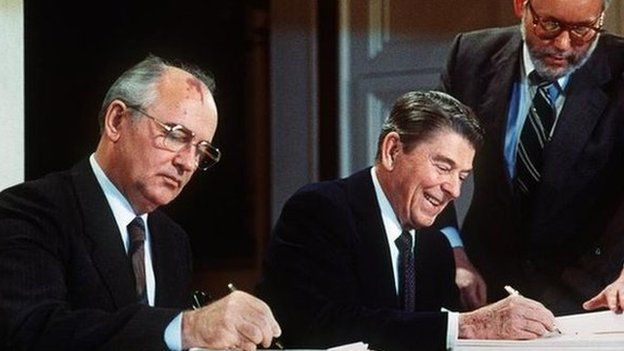Russia Plans New Missile Systems

The
Intermediate-Range Nuclear Forces Treaty (INF) banned the pair from using
short- and medium-range missiles.
The
US has long accused Russia of violating the pact, and last week US President
Donald Trump announced he would exit it. Russia followed suit.
The
moves have raised concerns about a new arms race.
The
INF was signed during the Cold War to ease a crisis in which US and Soviet
missiles were placed within range of European capitals.
On Tuesday, Russian
Defence Minister Sergei Shoigu said the aim was to create new land-based
missiles within the next two years.
Ground-launched
missiles were banned under the INF, but not sea or air-launched ones, which
Russia already possesses and that can be used to create the new systems.
Mr Shoigu said the
US was already violating the accord: "[The US] are actively working on
creating ground-based missiles with the range capability of over 500km, which
is outside the treaty-stipulated limitations.
"In
this situation, the Russian president has set the task for the defence ministry
to take tit-for-tat mirrored measures," he said.
The US is
yet to respond to Russia's announcement but AP news agency last week cited Trump officials as saying there were no
immediate plans to test or deploy missiles banned under the INF.
The Trump
administration has expressed concern at the threat posed by Russia as well as
countries outside the INF, in particular China.
Announcing
that the US was suspending its involvement in the INF and would leave it
completely in six months, President Trump said: "We cannot be the only
country in the world unilaterally bound by this treaty, or any other."
The
US accuses Russia of several violations, including their claims a new Russian
missile falls within the 500-5,500km (310-3,400 miles) range banned by the
treaty.
But
Russia says it is the US that has broken the pact, and says Washington is using
false allegations as a pretext to withdraw from a pact it never wanted to be
part of.
Russia is seen by
the US as having already breached the INF treaty by its deployment of a
ground-launched cruise missile, designated the 9M729 or SSC-8, Moscow is
clearly ahead in the race to field this previously banned category of weapons.
Reports
suggest Russia could already have deployed up to about 100 of these missiles.
President
Putin is now talking about developing a ground-launched version of the
successful Kalibr naval missile. He has also pointed to a potential hypersonic
weapon on which the US believes Russia has been working for some time.
So
perhaps there is not much that is new here.
The
US itself is already allocating funds for new missile research and development.
But
the real arms race here could be in the Asia-Pacific rather than Europe, where
both Russia and the US are wary of China's growing intermediate-range arsenal
which has never been restricted by any arms control agreement.
The
Intermediate-Range Nuclear Forces (INF) Treaty Signed by the US and the
USSR in 1987, the arms control deal banned all nuclear and non-nuclear
missiles with short and medium ranges, except sea-launched weapons
The US had been concerned by the Soviet deployment of the
SS-20 missile system and responded by placing Pershing and cruise missiles in
Europe - sparking widespread protests
By 1991, nearly 2,700 missiles had been destroyed
Both countries were allowed to inspect the other's
installations
In 2007, Russian President Vladimir Putin declared the
treaty no longer served Russia's interests
The move came after the US withdrew from the Anti-Ballistic
Missile Treaty in 2002
FROM .bbc.com/news/world-europe-

No comments